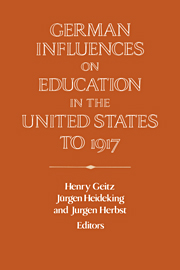Book contents
- Frontmatter
- Introduction
- PART ONE AMERICANS AND GERMANS LOOK AT EACH OTHER'S SCHOOLS
- PART TWO VARIETIES OF TEACHERS AND STYLES OF TEACHING
- PART THREE GERMAN SCHOOLS IN AMERICA
- PART FOUR THE GERMAN INFLUENCE ON HIGHER EDUCATION
- 11 American Students in Germany, 1815-1914: The Structure of German and U.S. Matriculants at Göttingen University
- 12 Philip Schaff: His Role in American Evangelical Education
- 13 German Influence on the Higher Education of American Women, 1865-1914
- 14 Basil L. Gildersleeve: The Formative Influence
- 15 A Mediator between Two Historical Worlds: Hermann Eduard von Hoist and the University of Chicago
- 16 German Influences on American Clinical Medicine, 1870-1914
- Index
13 - German Influence on the Higher Education of American Women, 1865-1914
Published online by Cambridge University Press: 05 January 2013
- Frontmatter
- Introduction
- PART ONE AMERICANS AND GERMANS LOOK AT EACH OTHER'S SCHOOLS
- PART TWO VARIETIES OF TEACHERS AND STYLES OF TEACHING
- PART THREE GERMAN SCHOOLS IN AMERICA
- PART FOUR THE GERMAN INFLUENCE ON HIGHER EDUCATION
- 11 American Students in Germany, 1815-1914: The Structure of German and U.S. Matriculants at Göttingen University
- 12 Philip Schaff: His Role in American Evangelical Education
- 13 German Influence on the Higher Education of American Women, 1865-1914
- 14 Basil L. Gildersleeve: The Formative Influence
- 15 A Mediator between Two Historical Worlds: Hermann Eduard von Hoist and the University of Chicago
- 16 German Influences on American Clinical Medicine, 1870-1914
- Index
Summary
At the newly opened University of Chicago in 1892-3, most of the women students were housed temporarily in the Hotel Beatrice. Shortly after the first of the year, Dean of Women Marion Talbot learned that one of the students wanted to have a party to “drink up” wine left over from the Christmas festivities at the Beatrice. Talbot, who had come to Chicago from the much more puritanical atmosphere of Wellesley, had found it difficult enough to accept that women students would drink at all; she certainly would not tolerate a party devoted primarily to the consumption of alcohol. Called to Talbot's office, the unnamed student defended her action by saying “that German professors drank at their meetings.” The flustered dean replied that the issue was “American ladies, not German professors.”
The impact of German professors and of German higher education in general on the United States has long been a subject of scholarly investigation. In the past two decades, the history of the higher education of American women has also become a well-researched field. Yet despite the many types of evidence available, of which the incident at the Beatrice is a very minor one, the two fields have seldom intersected. In part, this neglect has resulted from the diffuse nature of the topic, which does not lend itself to as straightforward an investigation as does the transmission across the Atlantic of the kindergarten or the research seminar.
- Type
- Chapter
- Information
- German Influences on Education in the United States to 1917 , pp. 227 - 244Publisher: Cambridge University PressPrint publication year: 1995
- 1
- Cited by



